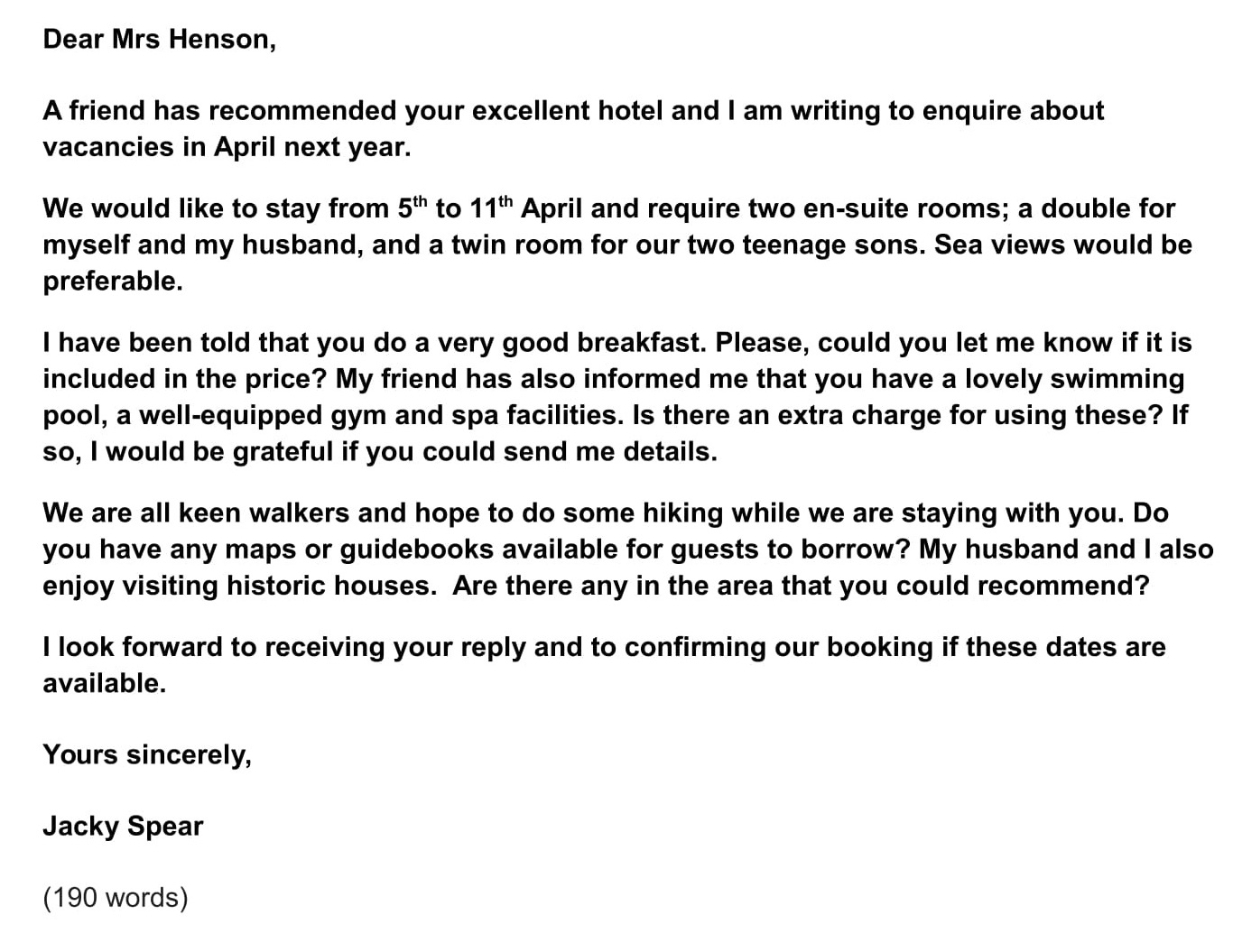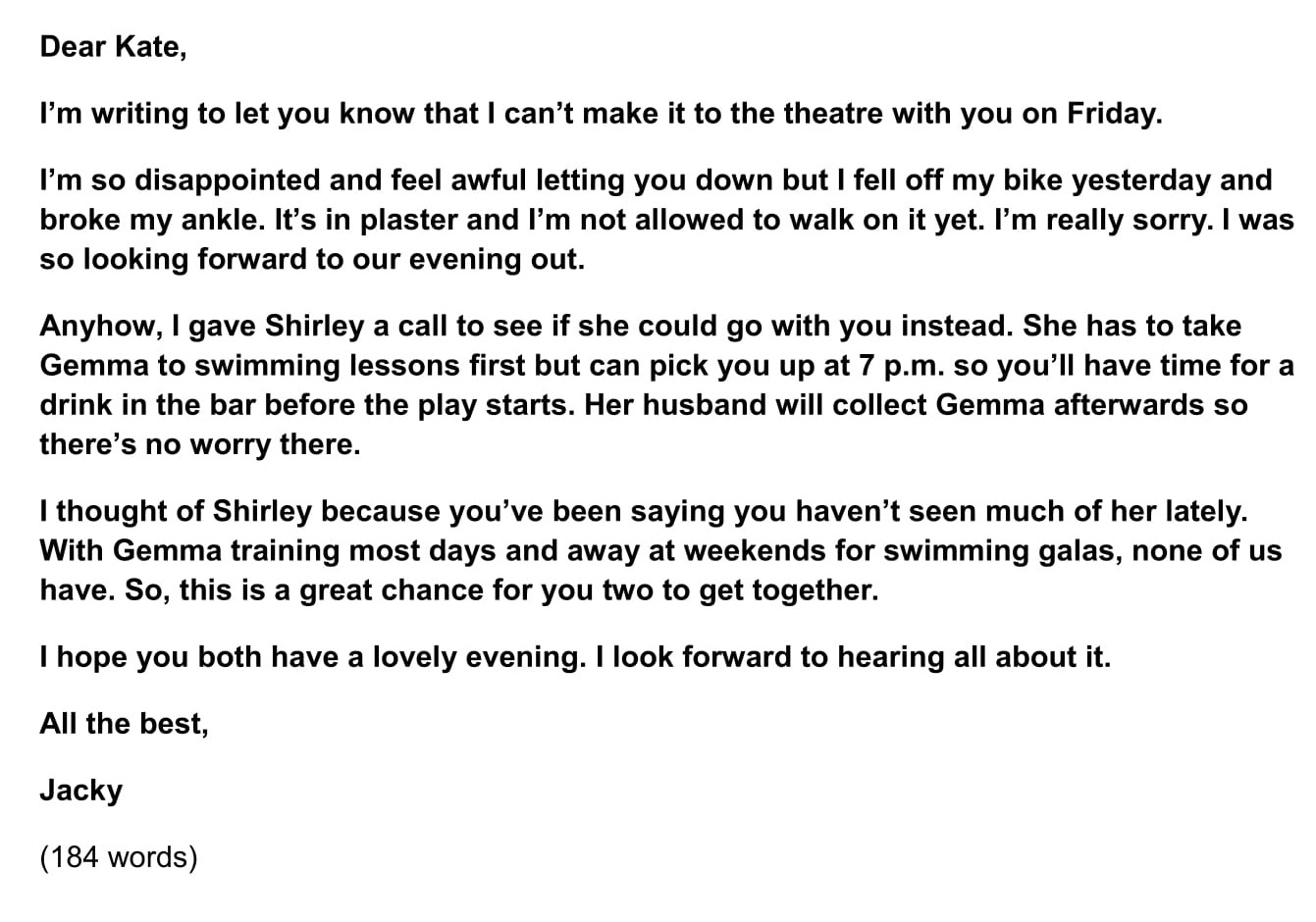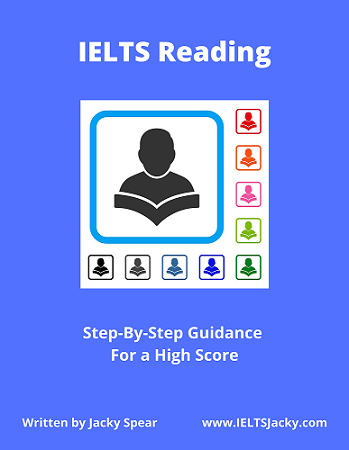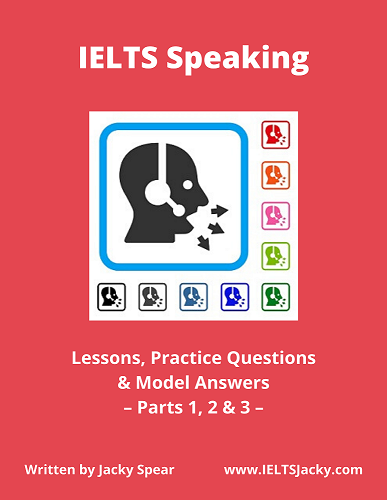IELTS Letter Sample
How To Write a Letter to Make an Arrangement
The IELTS letter sample in this lesson is a letter to make an arrangement. I take you through the whole process of writing it step-by-step.
Here’s what the lesson includes:
- Question structure
- Letter structure
- Formal or informal?
- Greeting & signoff
- Generating ideas
- Sample
letters
Question structure
All questions for IELTS letters have the same structure. They are made up of 3 parts.
Part 1 – The topic.
Part 2 – The person you must write to.
Part 3 – What you should write about (listed as 3 bullet points).
Here is a sample question with the 3 parts illustrated.
IELTS letter sample - question 1
|
You want to book a hotel recommended to you for a family holiday at the seaside. Write a letter to the hotel manager to make arrangements.
The topic Who you should write to What you should write about |
Understanding this will help you to quickly analyse the question and plan your answer. To help you plan, use the letter structure below.
For a full lesson on planning, including another IELTS letter sample, click here: How To Plan IELTS Letters
Letter structure
The layout of your letter should follow the structure of the question and consist of four paragraphs with a greeting at the beginning and a signoff at the end.
Use this easy to remember 6 part structure.
1) Dear .....
2) Paragraph 1: Purpose – why you are writing
3) Paragraph 2: Write about 1st bullet point
4) Paragraph 3: Write about 2nd bullet point
5) Paragraph 4: Write about 3rd bullet point
6) Signoff
All you need to do to create your plan is to add in the details from the question, like this:
1) Dear ..... (hotel
manager)
2) Paragraph 1: Purpose – to book hotel rooms
3) Paragraph 2: explain your accommodation needs & when you want to stay (bullet point 1)
4) Paragraph 3: ask what the price includes (bullet point 2)
5) Paragraph 4: enquire about activities & places of interest nearby (bullet point 3)
6) Signoff
Formal & Informal Letters
IELTS letters must be written in the appropriate tone and style. There are two options:
- Formal – to someone you don’t know or don’t know well.
- Informal – to a friend.
It is essential that you are able to identify what type of letter you’re required to write.
Follow this rule:
- If the question includes the word ‘friend’, use informal language.
- If the question does not include the word ‘friend’, use formal language.
To learn more about formal and informal letters and see an IELTS letter sample of each, click here:
The person we are writing to in this question is not a friend so, we must write a formal letter. This leads us on to the opening of the letter – the greeting.
The Greeting & Signoff
The Greeting
There are two ways you can begin a formal letter.
- Use Dear Sir or Madam if you don’t know the name of the person you are writing to.
- Use Dear + surname if you do know their name, e.g. Dear Mr Smith or Dear Mrs Jones.
It’s likely that you would not know the name of the hotel manager, although the friend might have told you when they recommended the hotel. If you want to use a surname, just make one up.
If you were writing an informal arrangement letter to a friend, you would use their first name, e.g. ‘Dear John’.
The greeting you use will determine how you sign off your letter.
The Signoff
For a formal letter, there are two main options. The correct one will depend on who you are addressing:
- Dear Mr Smith (name known) – Yours sincerely
- Dear Sir/Madam (name unknown) – Yours faithfully
You could also use ‘Kind regards’. This is formal but friendly and is appropriate for most situations. It is particularly useful if you struggle to remember how to spell ‘sincerely’ and ‘faithfully’.
Always sign off a formal letter with your full name, e.g. Jacky Spear
For an informal letter to a friend, use one of these phrases followed by your first name:
- All the best
- See you soon
- Keep in touch
For example,
See you soon,
Jacky
For our IELTS letter sample, we will use this greeting and signoff:
Dear Mrs Henson...
....Yours sincerely,
Jacky Spear
We are now ready to think up some ideas to write about. We have the guidelines of the 3 bullet points to help us so this won’t be difficult.
How To Generate Ideas for IELTS Letters
You only have to write 150 words, so you won’t need many ideas but do make sure that you write about each bullet point and develop each idea fully.
They don't have to be the best ideas you can possibly think of. Go with your first thoughts and don’t waste time trying to think of better ideas. However, they must relate directly to the bullet points.
Note them beside each bullet point on the exam paper, like this:
You want
to book a hotel recommended to you for a family holiday at the seaside.
Write a letter to the hotel manager to make arrangements.
- explain what accommodation you require and when you want to stay
Double room & twin room for 2 sons
- ask what will be included in the price
Breakfast, pool, gym & spa
- enquire about activities and places of interest near the hotel.
Walks & historic buildings
That’s our planning complete. Once you’ve had some practice, you’ll be able to do this in just a few minutes. Taking time to plan makes writing IELTS letters far quicker and easier than if you don’t do this step. You will also write a better letter and get higher marks.
We're now ready to start writing our letter.
Writing the Letter
Here’s our plan again with all our notes added in.
1) Dear ..... (hotel manager)
2) Paragraph 1: Purpose – to book hotel rooms
3) Paragraph 2: explain your accommodation needs and when you want to stay (bullet point 1)
Double room & twin room for 2 sons
4) Paragraph 3: ask what the price includes (bullet point 2)
Breakfast, pool, gym & spa
5) Paragraph 4: enquire about activities and places of interest nearby (bullet point 3)
Walks & historic buildings
6) Signoff
We’ve already decided on the greeting so we’ll start with paragraph 1.
Paragraph 1
In the first paragraph, you must state the reason for writing the letter, that is, its purpose.
Paragraph 1: Purpose – to book hotel rooms
Many students make the mistake of missing this purpose sentence out but it's very important. Including it will gain you marks.
It only requires one sentence. For example,
A
friend has recommended your excellent hotel and I am writing to enquire about
vacancies in April next year.
Top vocabulary tip: Do not use contractions in formal letters. They are informal language. So, do not write ‘I’m writing to enquire…’
Paragraph 2
In the second paragraph, you write about bullet point 1.
Paragraph 2: explain your accommodation needs and when you want to stay (bullet point 1)
Double room & twin room for 2 sons
Remember to
keep the language formal. You could write something like this.
We
would like to stay from 5th to 11th April and require two
en-suite rooms; a double for myself and my husband and a twin room for our two
teenage sons. Sea views would be preferable.
Paragraph 3
The third paragraph should cover the second bullet point.
Paragraph 3: ask what the price includes (bullet point 2)
Breakfast, pool, gym & spa
I have been told that you do a very
good breakfast. Please, could you let me know if it is included in the price?
My friend has also informed me that you have a lovely swimming pool, a
well-equipped gym and spa facilities. Is there an extra charge for using these?
If so, I would be grateful if you could send me details.
Paragraph 4
Paragraph 4 addresses the third bullet point.
Paragraph 4: enquire about activities and places of interest nearby (bullet point 3)
Walks & historic buildings
We are all keen walkers and hope to
do some hiking while we are staying with you. Do you have any maps or
guidebooks available for guests to borrow? My husband and I also enjoy visiting
historic houses. Are there any in the
area that you could recommend?
This letter needs one final sentence to round it off before we add the signoff. For example:
I
look forward to receiving your reply and to confirming our booking if these
dates are available.
Now we just need to add the signoff we decided on earlier and our letter is complete.
IELTS Letter Sample
Here is the finished letter.

Practice Question
To
get some practice writing this type of letter, write a letter for the question
below.
IELTS letter sample - question 2
You and your friend have booked tickets to go to the theatre. You are now unable to go but have found another friend to accompany him/her instead.
Write a letter to your friend. In the letter:
- explain why you can no longer go to the theatre with your friend
- say who is able to go instead of you
- tell them why you think this person would be good to go with.
This
letter is to a friend so must be written in an informal tone and style. Use the
planning structure I showed you above to plan before you start writing.
Here’s a sample letter. Can you identify the language and grammar structures I’ve used to make it informal? Note the use of contractions.

You'll find at least one IELTS letter sample in most of the lessons in the menu below.
|
Want to watch and listen? Click on this video. |
Common Letter Topics
IELTS General Writing Task 1 – All Lessons
Include many IELTS letter samples.
IELTS General Writing – A summary of the test including important facts, test format & assessment.
Letter
Format – The format, the 7 topics, letter
structure, formal & informal, assessment & marking criteria, sample
questions. Essential information you need to know.
Letter Writing Tips – Learn top tips on how to meet the assessment and marking criteria and achieve a high score.
Letter Writing Structure – Find out how to use this easy to learn letter structure to write a high-scoring letter. Includes a model answer.
How To Plan a Letter – Learn a simple 5 step process & 6 part letter structure. Also, help to understand the question & generate ideas.
Formal or Informal – How to decide what type of
letter to write. Sample questions & 2 model letters.
Letter Writing Vocabulary – Learn useful phrases to help you achieve a high score. Also, know how to start & end your letter.
How To Write an Informal Letter – Step-by-step instructions, simple 4 step plan & 6 part letter structure, model letter.
How To Write a Formal Letter – Step-by-step instructions, simple 4 step plan & 6 part letter structure, model letter.
Letter Topics – Learn the 7 most common letter topics & other popular subjects. Includes 20 sample questions.







